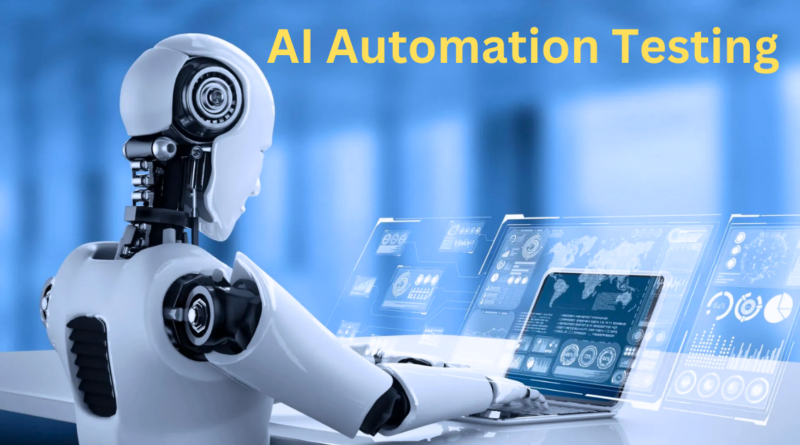What is AI Based Automation Testing?
The Importance of Automated Testing
What is AI Based Automation Testing As a software development professional, I have always been fascinated with automation testing’s advancements and its significance in assuring software quality and reliability. Automation testing refers to using automated scripts or tools to test cases against expected outcomes compared with actual results. This approach streamlines testing processes while decreasing human errors and speeding up testing cycles. Organizations can achieve faster time-to-market, increased test coverage, and enhanced software quality by automating repetitive or time-consuming test scenarios.
Lower Cost And Effort
Automation testing’s significance lies in its ability to significantly lower cost and effort in software development testing phases. Given the increasing complexity of modern apps, manual testing alone may no longer suffice in validating all functionalities and integrations properly. Automation testing addresses this challenge and allows teams to identify defects early in development lifecycle processes and attain higher test coverage across operating systems, browsers, and devices.
Artificial Intelligence (AI) has transformed automation testing, opening up a range of capabilities beyond traditional automation techniques. By harnessing AI’s power, organizations can use sophisticated algorithms and machine learning models to bolster test case creation, execution, and result analysis – significantly increasing efficiency and accuracy as well as predictive analytics and intelligent automation to usher in AI-based automation testing processes.
The Role of AI in Automation Testing
AI in automation testing can provide organizations with a powerful way of meeting the ever-evolving challenges and complexities associated with modern software applications. AI revolutionizes test case design and execution by harnessing its cognitive abilities to identify patterns, anomalies, and risk areas within software under test. Organizations can leverage real-time feedback and historical data for more effective coverage and defect identification through intelligent algorithm-powered test automation solutions like those provided by AI providers.
Self-Healing Test Automation
AI also plays a pivotal role in providing self-healing test automation. AI algorithms can autonomously identify and correct test script failures by examining their underlying causes and making necessary adjustments. This proactive approach reduces manual intervention needed for maintaining test scripts while also increasing the robustness and reliability of the automation testing framework. Furthermore, AI enables predictive maintenance for automation testing by anticipating potential issues based on the application’s and environment’s historical performance.
Artificial Intelligence in automation testing transcends the limitations of rule-based test automation, ushering in an era of adaptive and intelligent testing tailored to today’s software applications.
Advantages
It brings numerous advantages, covering various facets of the testing lifecycle and contributing to the overall efficiency, accuracy, and reliability of software development processes. One key benefit is its ability to significantly decrease the time and effort needed for creating and maintaining test scripts – using AI algorithms for this process expedites test automation processes as organizations easily adapt to changes in application interfaces or functionalities.
Higher Test Coverage
This also enables organizations to achieve higher test coverage by identifying the most pertinent test scenarios based on an application’s usage patterns, user interactions, and system dependencies. This adaptive test coverage ensures that critical areas of an app are thoroughly validated – thus increasing quality and reliability overall. AI also facilitates intelligent test data generation; its algorithms can analyze the application data dependencies and generate diverse test datasets that mimic real-world use scenarios.
Utilize Predictive Analytics
AI-based automation testing enables organizations to utilize predictive analytics to identify areas of risk, performance bottlenecks, and scalability limitations within an application, mitigating potential defects while optimizing user experience. AI algorithms analyze test results in real-time and provide actionable insights for stakeholders, enabling informed decision-making and proactive defect resolution.
Automation Testing Tools and Technologies
These tools and technologies abound with cutting-edge solutions that leverage artificial intelligence (AI) and machine learning techniques to expand traditional test automation frameworks. AI-powered test case design and generation platforms stand out, using algorithms to analyze user flows, system interactions, and historical test data in an application to automatically generate comprehensive test scenarios that cover critical functionalities and edge cases.
Expediting Testing Processes
AI-powered test execution and result analysis tools are pivotal in expediting testing processes while assuring accurate test outcomes. Leveraging AI/ML to optimize execution across environments/configurations/complexities; identify anomalies within and results; provide intelligent recommendations to address potential defects. In addition, AI-based maintenance/self-healing tools enable organizations to automate the maintenance of test scripts, detect script failures before they happen, autonomously adapt tests in response to changing app requirements, and rectify issues by adapting test scripts accordingly.
AI Integration Within Test Data Management Tools
AI integration within test data management tools is another integral element of AI-based automation testing. It enables organizations to utilize intelligent algorithms for creating realistic test datasets while protecting sensitive information and optimizing its use across test scenarios. Furthermore, AI-powered environment provisioning and management tools help organizations allocate testing resources according to specific system interactions or orchestrate environments based on requirements from specific test scenarios.
Implementing Automation Testing in Your Organization
Implementing AI-based automation testing within your organization requires a deliberate, strategic approach that incorporates all aspects of the testing lifecycle, tooling, skill development, and stakeholder engagement. The first step on the journey towards AI adoption in automation testing should be assessing existing frameworks to identify areas where AI could bring tangible benefits in terms of efficiency, coverage, and reliability – this involves conducting a detailed audit of current test automation processes, tools, and challenges as well as potential use cases where AI could augment testing capabilities.
Organizations investment
Organizations should invest in AI-powered automation testing tools and technologies that meet their requirements and objectives for testing. This process includes researching available AI solutions in the market and understanding their capabilities, integration requirements, and scalability before selecting those most suited to an organization’s testing ecosystem. Furthermore, organizations must invest in building capabilities within their testing teams that leverage AI algorithms effectively for test case design, execution, and result analysis.
Establish Effective Governance And Quality Assurance Process
Furthermore, it is vital to establish effective governance and quality assurance processes for AI-based automation testing to ensure its integration does not deteriorate the overall quality and reliability of test outcomes. This involves creating robust guidelines for AI algorithm training, validation, and deployment and mechanisms for monitoring their performance and accuracy during AI-based testing processes. In addition, organizations must foster an environment of cooperation among development, testing, and AI teams and create cross-functional knowledge-sharing interactions between teams to facilitate successful implementation in automation testing processes.
Best Practices for Automa–tion Testing
Adherence to best practices is vital for optimizing the benefits of AI based automation testing and its seamless integration into the software development lifecycle. One such practice involves using a case-driven approach when conducting AI testing, where organizations identify specific test cases or functionalities that would most benefit from artificial intelligence augmentation. By targeting particular use cases, organizations can gradually integrate AI into existing automation testing processes while validating the efficacy of algorithms before expanding scope based on proven benefits.
Artificial Intelligence Algorithms For Automation Testing
Companies should prioritize the quality and diversity of training data used by artificial intelligence algorithms for automation testing by collecting comprehensive datasets encompassing user interactions, system behaviors, edge cases, and edge cases – this will allow AI algorithms to generalize efficiently across test scenarios. In addition, organizations must set up robust mechanisms for validating and benchmarking AI-based automation testing against traditional automation techniques to ensure it results in tangible improvements in test coverage, defect identification, and overall testing efficiency.
Overcoming Challenges
AI integration in automation testing presents many advantages and unique challenges that organizations must meet head-on. Chief among them is obtaining talent with AI/ML expertise for testing teams. Organizations must address this challenge by upskilling their testing professionals and providing training and resources that enable them to understand AI, machine learning, and their applications in automation testing. Furthermore, encouraging collaboration among testing teams and AI specialists may foster knowledge transfer and skill development, allowing testing professionals to use AI algorithms more effectively in their testing endeavors.AI-based automation testing presents organizations with another significant challenge.
Transparency Of AI Algorithms
Understanding and transparency of AI algorithms used for test case design, execution, and result analysis. To address this challenge, organizations should focus on creating explainable AI models that provide clear insight into their decision-making processes – by helping stakeholders understand the logic behind testing decisions derived by AI, trust in this form of automation testing can be established with stakeholders while assuring alignment with quality and reliability standards.
Organizations should remain mindful of ethical and regulatory considerations associated , specifically regarding sensitive data handling, bias mitigation, algorithmic fairness, and algorithmic justice.
This requires creating robust governance frameworks and compliance protocols to ethically oversee AI use for testing purposes while safeguarding user privacy, data security, and regulatory adherence.
Moreover, organizations must proactively address potential biases or limitations within AI algorithms by engaging diverse perspectives to validate the fairness and inclusivity of testing processes using AI.
Automation Testing vs. Manual Testing
Comparison between AI-driven automation and manual testing shows each approach’s distinct advantages and trade-offs, highlighting AI’s value proposition when used to complement traditional testing techniques. Manual testing offers greater depth than automated scripts can in terms of understanding user interactions, testing cases, exploring application functionalities, validating user interactions, and uncovering complex usability issues, edge cases, or non-deterministic behaviors that elude automated scripts – providing qualitative insights into performance metrics as well as user satisfaction levels.
Manual Testing
- Manual testing can be time-consuming, labor-intensive, and prone to human error when repeatedly executed across different environments and configurations.
- Furthermore, its limited scalability and repeatability render it unsuitable for agile/DevOps-driven software development processes with rapid feedback cycles requiring comprehensive test coverage and quick feedback cycles.
- AI-based automation testing addresses these limitations with intelligent test case generation, execution, and result analysis capabilities, significantly speeding up testing processes while improving coverage and mitigating human errors.
AI-based Automation Testing
AI-based automation testing enables organizations to:
- leverage predictive analytics,
- anomaly detection,
- and self-healing capabilities of artificial intelligence
in testing to proactively identify and address potential defects, performance bottlenecks, or scaling limitations within applications.
This proactive approach increases testing efficiency and empowers organizations with higher reliability and robustness of software apps.
Furthermore, this type of test offers organizations the agility and adaptability required to keep pace with the rapid advancement of applications by dynamically altering test scenarios based on real-time feedback or usage patterns – an advantage over manual testing, which cannot be done.
While manual testing remains invaluable for certain aspects of software validation, AI-driven automation testing offers significant advantages regarding efficiency, scalability, and reliability, making it a key part of modern software testing strategies.
Future Trends in AI-Based Automation Testing
Future trends for AI-based automation testing include:
- Constant innovation.
- The converging of technologies.
- Intelligent testing paradigms are emerging to meet the dynamic landscape of software development.
One of the prevailing trends is AI-powered autonomous testing, where AI algorithms generate and execute test cases and autonomously analyze an application’s behavior and risk areas to optimize testing in real time. This autonomous testing paradigm enables organizations to achieve continuous testing with self-healing test automation and intelligent scenario adaptation for unprecedented efficiency and reliability in testing processes.
Integrating AI With Emerging Technologies
Integrating AI with emerging technologies like robotic process automation (RPA) and natural language processing (NLP) is expected to significantly expand its potential applications for AI-based automation testing. By employing RPA for automating test data generation, test environment provisioning, and test result analysis, organizations can seamlessly integrate end-to-end testing processes within software development lifecycle processes.
Furthermore, NLP-powered AI algorithms help organizations glean actionable insights from natural language test artifacts like requirements documents, user stories, defect reports, etc., thus providing accurate intelligence test scenario identification and validation capabilities.
Evolution
The evolution of is also marked by the increasing emphasis on ethical AI, bias mitigation, and algorithmic fairness in testing processes. As organizations leverage AI algorithms for critical testing decisions, there is a growing recognition of the need to ensure that AI-driven testing outcomes are transparent, unbiased, and aligned with ethical standards. This necessitates the development of robust frameworks for explainable AI, fairness validation, and bias detection, enabling organizations to build trust in AI-based automation testing and ensure equitable testing outcomes.
Combination Of AI And Quantum Computing
AI and quantum computing combine to unleash unprecedented potential in AI-based automation testing, giving organizations unparalleled capabilities for complex testing challenges such as cryptographic validation, simulation of quantum computing environments, and optimizing quantum algorithms specifically for testing purposes. Furthermore, this convergence opens new horizons for scalability, security validation, and performance benchmarking purposes, making AI-based automation testing a key enabler of quantum-ready software applications.
Conclusion
AI-powered automation testing is a revolutionary force in software , offering unrivaled efficiency, accuracy, and adaptability. By understanding the differences between AI-based automation testing and manual understanding its fundamentals, as well as anticipating potential trends, organizations can unleash AI’s full potential to enhance their capabilities. As technology rapidly develops, adopting AI-driven testing automation solutions is increasingly necessary for staying competitive in the software industry.
Organizations can embark on a journey towards seamless, intelligent, and future-ready software testing practices by employing the appropriate combination of tools, expertise, and strategic implementation strategies to integrate AI testing practices seamlessly.




